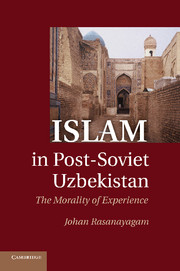Book contents
- Frontmatter
- Contents
- Illustrations
- Acknowledgements
- Note on Transliteration
- MAP: Uzbekistan and its neighbours
- Introduction: Towards an Anthropology of Moral Reasoning
- 1 Islam and Sociality in Pakhtabad and Samarkand
- 2 The New Soviet (Central Asian) Person and the Colonisation of Consciousness
- 3 Good and Bad Islam after the Soviet Union
- 4 The Practical Hegemony of State Discourse
- 5 The Moral Sources of Experience
- 6 Moral Reasoning through the Experience of Illness
- 7 Debating Islam through the Spirits
- 8 Experience, Intelligibility, and Tradition
- Notes
- Bibliography
- Index
6 - Moral Reasoning through the Experience of Illness
Published online by Cambridge University Press: 01 March 2011
- Frontmatter
- Contents
- Illustrations
- Acknowledgements
- Note on Transliteration
- MAP: Uzbekistan and its neighbours
- Introduction: Towards an Anthropology of Moral Reasoning
- 1 Islam and Sociality in Pakhtabad and Samarkand
- 2 The New Soviet (Central Asian) Person and the Colonisation of Consciousness
- 3 Good and Bad Islam after the Soviet Union
- 4 The Practical Hegemony of State Discourse
- 5 The Moral Sources of Experience
- 6 Moral Reasoning through the Experience of Illness
- 7 Debating Islam through the Spirits
- 8 Experience, Intelligibility, and Tradition
- Notes
- Bibliography
- Index
Summary
Chapter 5 discussed the moral quality of experience, and in this chapter I explore its creativity. Experiential reasoning is not only a self-conscious, cognitive activity of the mind but is inherent in life as it is lived. It takes place within embodied, intersubjective engagement in a social and material world. At the same time, experience is not ‘neutral’ or unmediated but is refracted through models for action, cosmologies, and local histories that make possible particular qualities of experience. It is creatively configured and made meaningful within a developing narrative frame.
I have chosen illness as a context for examining moral reasoning because it introduces an obvious break into the flow of experience. It presents a point of discontinuity, an interruption and challenge that demands attention (Good 1994; Mattingly 1998). Perhaps because of this, a significant body of literature has developed that seeks to explore personal illness as an experience through which sufferers and those around them construct meaning. Arthur Kleinman has distinguished between illness, disease, and sickness. The former is the subjective experience of suffering – how sufferers themselves perceive affliction and how this is shaped through cultural orientations and within social networks. Disease is the objectification of the sufferer's complaint by expert practitioners through the lens of their particular form of practice, whether they are doctors trained within a Western biomedical tradition or the healers described in Chapter 7 who work with the aid of spirits.
- Type
- Chapter
- Information
- Islam in Post-Soviet UzbekistanThe Morality of Experience, pp. 180 - 202Publisher: Cambridge University PressPrint publication year: 2010



